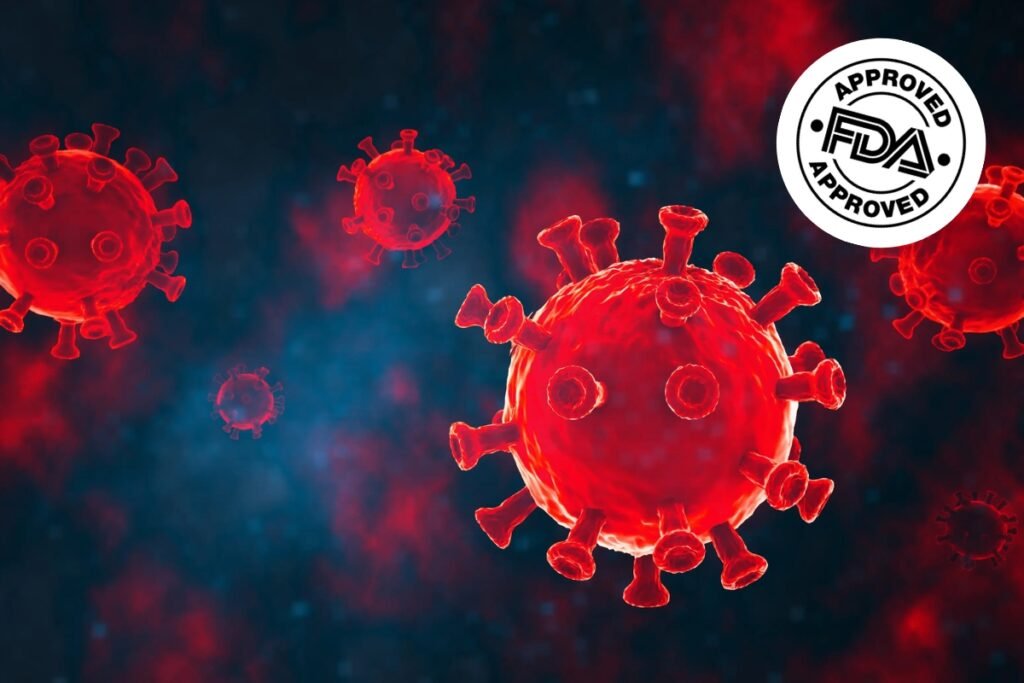On May 19, 2023, AbbVie announced that the U.S. Food and Drug Administration (FDA) granted approval to EPKINLYTM (epcoritamab-bysp) as the first and only T-cell engaging bispecific antibody for the treatment of relapsed or refractory diffuse large B-cell lymphoma (DLBCL) in adult patients. This includes DLBCL not otherwise specified (NOS), DLBCL arising from indolent lymphoma, and high-grade B-cell lymphoma (HGBL) after two or more lines of systemic therapies. The FDA’s Accelerated Approval program was used based on the response rate and durability of response, with continued approval contingent upon verification and description of clinical benefit in confirmatory trials. EPKINLY is a result of the collaboration between AbbVie and Genmab in the field of oncology.
DLBCL is an aggressive cancer type that can rapidly progress and resist treatment. The FDA approval of EPKINLY represents a new treatment mechanism of action for third line DLBCL patients. As a non-chemotherapy, single-agent treatment for DLBCL patients, we hope that EPKINLY can effectively treat this aggressive cancer type and can be used for patient care quickly and in an off the shelf form for physicians,” said Thomas Hudson, M.D., senior vice president, research and development, chief scientific officer, AbbVie. “The approval is just the first step, with our partner Genmab, towards a shared goal of developing a core therapy for patients with B-cell malignances.”
In the EPCORE NHL-1 trial’s expansion cohort, 148 patients with CD20+ DLBCL participated. Among them, 86 percent had DLBCL NOS, including 27 percent with DLBCL transformed from indolent lymphoma, and 14 percent had HGBL. The patients had a median of three prior therapies, with 30% receiving two prior therapies, 30% receiving three prior therapies, and 40% receiving four or more prior therapies. Of the participants, 18% had undergone autologous hematopoietic stem cell transplantation (HSCT), and 39% had received chimeric antigen receptor (CAR) T-cell therapy. Eighty-two percent of the patients had refractory disease to their last therapy, and 29% were refractory to CAR T-cell therapy.
EPKINLY demonstrated an overall response rate of 61%, with a complete response rate of 38% and a median duration of response of 15.6 months in heavily pretreated relapsed or refractory DLBCL patients.
“Patients with DLBCL who relapse or are refractory to currently available therapies have limited options. Generally, the prognosis for these patients is poor and management of this aggressive disease can be challenging,” said Tycel Phillips, M.D., City of Hope Associate Professor, Division of Lymphoma, Department of Hematology & Hematopoietic Cell Transplantation. “Epcoritamab is a subcutaneous bispecific antibody that offers an additional treatment option for this patient population. With this approval, patients who are in need of additional therapy may have the opportunity to receive epcoritamab after failure to respond or relapse after two or more systemic therapies.”
The prescribing information for EPKINLY carries a Boxed Warning concerning serious or life-threatening cytokine release syndrome (CRS) and immune effector cell-associated neurotoxicity syndrome (ICANS). Warnings and precautions include infections, cytopenias, and embryo-fetal toxicity. The most common adverse reactions (occurring in 20 percent or more of patients) include CRS, fatigue, musculoskeletal pain, injection site reactions, pyrexia, abdominal pain, nausea, and diarrhoea.
The approval of EPKINLY as the first T-cell engaging bispecific antibody for R/R DLBCL represents a significant advancement in treatment options for patients facing limited options. The response rates and duration of response observed in the clinical trial demonstrate the potential of EPKINLY to address the needs of heavily pretreated patients. However, healthcare providers and patients should be aware of the potential for serious side effects and closely monitor them. The approval of EPKINLY underscores the progress being made in the field of oncology and provides hope for improved outcomes for patients with relapsed or refractory DLBCL.
“The FDA approval of EPKINLY represents a new treatment for diffuse large B-cell lymphomas among patients who have relapsed or have refractory disease and are looking for a new medication,” said Meghan Gutierrez, chief executive officer, Lymphoma Research Foundation.





























